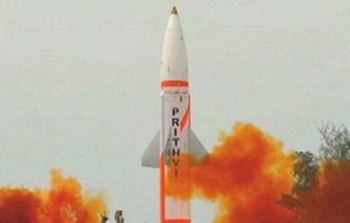 Balasore(Odisha), Oct 7: India today test-fired its indigenously developed nuclear-capable Prithvi-II missile with a strike range of 350 km from a test range at Chandipur, about 15 km from here.
Balasore(Odisha), Oct 7: India today test-fired its indigenously developed nuclear-capable Prithvi-II missile with a strike range of 350 km from a test range at Chandipur, about 15 km from here.
The surface-to-surface missile was test fired from a mobile launcher in salvo mode from launch complex-3 of the Integrated Test Range at about 9.14 AM, defence sources said.
"The missile was randomly chosen from the production stock and the total launch activities were carried out by the specially formed SFC and monitored by the scientists of DRDO as part of practice drill," the sources said.
"The missile trajectory will be tracked by the DRDO radars, electro-optical tracking systems and telemetry stations located along the coast of Odisha," they said.
"The downrange teams onboard the ship deployed near the designated impact point in the Bay of Bengal will monitor the terminal events and splashdown," they said.
Inducted into India's Strategic Forces Command in 2003, the Prithvi II missile, the first missile to be developed by DRDO under India's prestigious IGMDP (Integrated Guided Missile Development Program) is now a proven technology, said a defence source.
"The launch was part of a regular training exercise of SFC and was monitored by DRDO scientists," the source said.
Such training launches clearly indicate India's operational readiness to meet any eventuality and also establishes the reliability of this deterrent component of India's Strategic arsenal, the source said.
Prithvi is capable of carrying 500kg to 1000kg of warheads and is thrusted by liquid propulsion twine engines. It uses advanced inertial guidance system with manoeuvering trajectory.
The last user trial of Prithvi-II was successfully carried out from the same base on August 12, 2013.





Comments
Add new comment